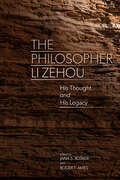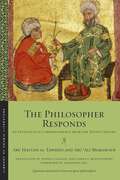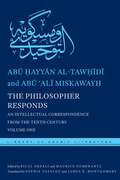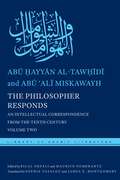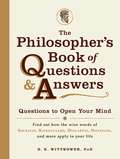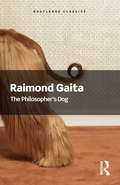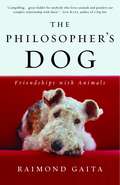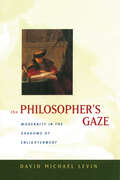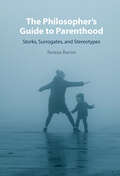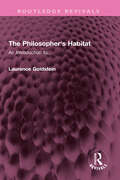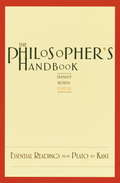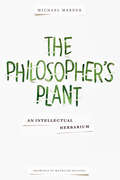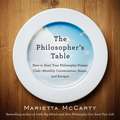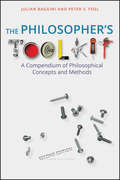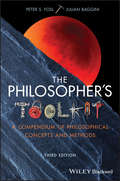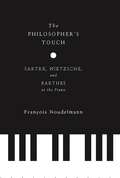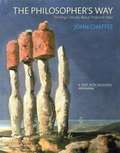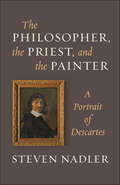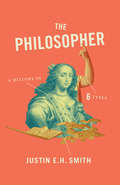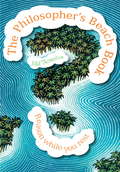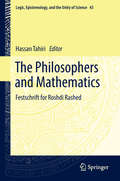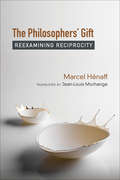- Table View
- List View
The Philosopher Li Zehou: His Thought and His Legacy (SUNY series in Chinese Philosophy and Culture)
by Jana S. Rošker; Roger T. AmesDeepens our understanding of this contemporary Chinese thinker's philosophy and its significance.Li Zehou (1930–2021) was one of China's most prominent contemporary philosophers, transforming Confucian philosophy into a resource for positive change. From a critical rereading of the Analects to a formulation of his own aesthetic theory, Li reinterpreted the tradition from earliest times down to the present day. In this effort, he was inspired by Marx and Kant but was neither a Marxist nor a Kantian. Nor was he a Confucian. He was, and remains, an original: the philosopher Li Zehou.In this volume, Chinese, European, and US scholars explore Li's contributions to Chinese philosophy and culture, deepening our understanding of his philosophy and its significance while also celebrating the intellectual diversity and richness of Chinese philosophical thought. In a passionate and dedicated endeavor to ensure that Li's philosophy endures and continues to inspire scholars, particularly the younger generation of academics, both in China and around the world, the volume aims to serve as a catalyst for ongoing scholarship and discourse on the work of the philosopher Li Zehou.
The Philosopher Responds: An Intellectual Correspondence from the Tenth Century (Library of Arabic Literature)
by Abū Ḥayyān al-Tawḥīdī Abū ʿAlī MiskawayhQuestions and answers from two great philosophersWhy is laughter contagious? Why do mountains exist? Why do we long for the past, even if it is scarred by suffering? Spanning a vast array of subjects that range from the philosophical to the theological, from the philological to the scientific, The Philosopher Responds is the record of a set of questions put by the litterateur Abū Ḥayyān al-Tawḥīdī to the philosopher and historian Abū ʿAlī Miskawayh. Both figures were foremost contributors to the remarkable flowering of cultural and intellectual life that took place in the Islamic world during the reign of the Buyid dynasty in the fourth/tenth century.The correspondence between al-Tawḥīdī and Miskawayh holds a mirror to many of the debates of the time and reflects the spirit of rationalistic inquiry that animated their era. It also provides insight into the intellectual outlooks of two thinkers who were divided as much by their distinctive temperaments as by the very different trajectories of their professional careers. Alternately whimsical and tragic, trivial and profound, al-Tawḥīdī’s questions provoke an interaction as interesting in its spiritedness as in its content.An English-only edition.
The Philosopher Responds: An Intellectual Correspondence from the Tenth Century, Volume One (Library of Arabic Literature #19)
by Abū Ḥayyān al-Tawḥīdī Abū ʿAlī MiskawayhQuestions and answers from two great philosophersWhy is laughter contagious? Why do mountains exist? Why do we long for the past, even if it is scarred by suffering? Spanning a vast array of subjects that range from the philosophical to the theological, from the philological to the scientific, The Philosopher Responds is the record of a set of questions put by the litterateur Abu Hayyan al-Tawhidi to the philosopher and historian Abu 'Ali Miskawayh. Both figures were foremost contributors to the remarkable flowering of cultural and intellectual life that took place in the Islamic world during the reign of the Buyid dynasty in the fourth/tenth century. The correspondence between al-Tawhidi and Miskawayh holds a mirror to many of the debates and preoccupations of the time and reflects the spirit of rationalistic inquiry that animated their era. It also provides insight into the intellectual outlooks of two thinkers who were divided as much by their distinctive temperaments as by the very different trajectories of their professional careers. Alternately whimsical and tragic, wondering and brooding, trivial and profound, al-Tawhidi’s questions provoke an interaction as interesting in its spiritedness as in its content. This new edition of The Philosopher Responds is accompanied by the first full-length English translation of this important text, bringing this interaction to life for the English reader.A bilingual Arabic-English edition.
The Philosopher Responds: An Intellectual Correspondence from the Tenth Century, Volume Two (Library of Arabic Literature #24)
by Abū Ḥayyān al-Tawḥīdī Abū ʿAlī MiskawayhQuestions and answers from two great philosophersWhy is laughter contagious? Why do mountains exist? Why do we long for the past, even if it is scarred by suffering? Spanning a vast array of subjects that range from the philosophical to the theological, from the philological to the scientific, The Philosopher Responds is the record of a set of questions put by the litterateur Abu Hayyan al-Tawhidi to the philosopher and historian Abu 'Ali Miskawayh. Both figures were foremost contributors to the remarkable flowering of cultural and intellectual life that took place in the Islamic world during the reign of the Buyid dynasty in the fourth/tenth century. The correspondence between al-Tawhidi and Miskawayh holds a mirror to many of the debates and preoccupations of the time and reflects the spirit of rationalistic inquiry that animated their era. It also provides insight into the intellectual outlooks of two thinkers who were divided as much by their distinctive temperaments as by the very different trajectories of their professional careers. Alternately whimsical and tragic, wondering and brooding, trivial and profound, al-Tawhidi’s questions provoke an interaction as interesting in its spiritedness as in its content. This new edition of The Philosopher Responds is accompanied by the first full-length English translation of this important text, bringing this interaction to life for the English reader.A bilingual Arabic-English edition.
The Philosopher's Book of Questions & Answers: Questions to Open Your Mind
by D. E. WittkowerYour life through the lens of the world's greatest thinkers!Do you ever wonder how important money really is in life or what you need to do to achieve happiness? With The Philosopher's Book of Questions and Answers, you will be one step closer to solving these uncertainties. Inside, you'll find the basics of philosophy, written in plain English, and thoughts for applying these important theories to your own life. You'll also be encouraged to dig deep into the philosophical reasoning behind your everyday actions with a series of fascinating prompts, such as:If you had ten times your wealth and ten times your income, what would you do then that you can't do now?What's a version of that activity that you could do right now?Is it ten times less meaningful, important, or enjoyable than the activity you would do with more money? From Socrates and Epicurean to Kierkegaard and Nietzsche, The Philosopher's Book of Questions and Answers will not only help you grasp history's greatest thoughts, but will also unveil the world in a whole new light.
The Philosopher's Book of Questions and Answers
by D. E. WittkowerYour life through the lens of the world's greatest thinkers! Do you ever wonder how important money really is in life or what you need to do to achieve happiness? With The Philosopher's Book of Questions and Answers, you will be one step closer to solving these uncertainties. Inside, you'll find the basics of philosophy, written in plain English, and thoughts for applying these important theories to your own life. You'll also be encouraged to dig deep into the philosophical reasoning behind your everyday actions with a series of fascinating prompts, such as: If you had ten times your wealth and ten times your income, what would you do then that you can't do now? What's a version of that activity that you could do right now? Is it ten times less meaningful, important, or enjoyable than the activity you would do with more money? From Socrates and Epicurean to Kierkegaard and Nietzsche, The Philosopher's Book of Questions and Answers will not only help you grasp history's greatest thoughts, but will also unveil the world in a whole new light.
The Philosopher's Book of Questions and Answers
by D. E. WittkowerYour life through the lens of the world's greatest thinkers! Do you ever wonder how important money really is in life or what you need to do to achieve happiness? With The Philosopher's Book of Questions and Answers, you will be one step closer to solving these uncertainties. Inside, you'll find the basics of philosophy, written in plain English, and thoughts for applying these important theories to your own life. You'll also be encouraged to dig deep into the philosophical reasoning behind your everyday actions with a series of fascinating prompts, such as: If you had ten times your wealth and ten times your income, what would you do then that you can't do now? What's a version of that activity that you could do right now? Is it ten times less meaningful, important, or enjoyable than the activity you would do with more money? From Socrates and Epicurean to Kierkegaard and Nietzsche, The Philosopher's Book of Questions and Answers will not only help you grasp history's greatest thoughts, but will also unveil the world in a whole new light.
The Philosopher's Dog (Routledge Classics)
by Raimond GaitaIn this beautifully written book Raimond Gaita tells inspirational, poignant, sometimes funny but never sentimental stories of the dogs, cats and cockatoos that lived and died within his own family. He asks fascinating questions about animals: Is it wrong to attribute the concepts of love, devotion, loyalty, grief or friendship to them? Why do we care so much for some creatures but not for others? Why are we so concerned with proving that animals have minds? Reflecting on these questions, and drawing on the ideas of Descartes, Wittgenstein and J.M. Coetzee, Gaita pleads that we ask ourselves what it means to be creatures of ‘flesh and blood.’ He discusses mortality and sexuality, the relations between storytelling, philosophy and science and the spiritual love of mountains. An arresting and profound book, The Philosopher’s Dog is a triumph of both storytelling and philosophy. This Routledge Classics edition includes a substantial new introduction and afterword by the author.
The Philosopher's Dog: Friendships with Animals
by Raimond GaitaThe philosopher Raimond Gaita has always been fascinated by animals– their obvious intelligence and disturbing brutality, their uncanny responsiveness to our moods and needs, the deep feelings they elicit from us and seem to return. In this marvelous, luminous book, Gaita trains the lens of philosophy on the mystery and beauty of the animals he has known and loved best. The Philosopher’s Dogis one of those rare works that engage the heart from the very first paragraph and haunt the mind long after one has finished reading. What does Gaita’s dog, Gypsy, think about while she sits on her mat gazing out to sea for hours on end? Why did the irascible cockatoo Jack greet Gaita’s father with kisses each morning but bite everyone else? How can we acknowledge that animals are sentient and yet deny that they have consciousness? Is it possible to love animals and still eat meat? In contemplating questions like these, Gaita weaves together personal stories–inspiring, sometimes heartbreaking accounts about the animals he and his family members have sheltered–with the reflections and analysis of a professional philosopher. A graceful, engaging stylist, Gaita is perfectly lucid as he grapples with great thinkers through the ages–from Socrates to Wittgenstein, Descartes to Hannah Arendt. And yet, as important as formal philosophy has been to him, Gaita frankly acknowledges that he has learned much about the nature of life from Gypsy and Jack and his courageously arrogant cat Tosca. In the end, he argues that love should be the essence of our bond with animals, the critical factor that guides how we treat them and think about their place in our world. In pondering the meaning and morality of his relationships with animals, and with the natural world more generally, Raimond Gaita has created a surprising masterpiece, a book of startling insights, spellbinding stories, meticulous observations, and wise reflection. At once engrossing and thought-provoking,The Philosopher’s Dog is a supremely enjoyable book. From the Hardcover edition.
The Philosopher's Gaze: Modernity in the Shadows of Enlightenment
by David Michael LevinDavid Michael Levin's ongoing exploration of the moral character and enlightenment-potential of vision takes a new direction in The Philosopher's Gaze. Levin examines texts by Descartes, Husserl, Wittgenstein, Nietzsche, Heidegger, Benjamin, Merleau-Ponty, and Lévinas, using our culturally dominant mode of perception and the philosophical discourse it has generated as the site for his critical reflections on the moral culture in which we are living.In Levin's view, all these philosophers attempted to understand, one way or another, the distinctive pathologies of the modern age. But every one also attempted to envision—if only through the faintest of traces, traces of mutual recognition, traces of another way of looking and seeing—the prospects for a radically different lifeworld. The world, after all, inevitably reflects back to us the character, the reach and range, of our vision.In these provocative essays, the author draws on the language of hermeneutical phenomenology and at the same time refines phenomenology itself as a method of working with our experience and thinking critically about the culture in which we live.
The Philosopher's Guide to Parenthood: Storks, Surrogates, and Stereotypes
by Teresa BaronOur understanding of what it means to be a parent in any given context is shaped by our biological, social, legal, and moral concepts of parenthood. These are themselves subject to the influence of changing expectations, as new technologies are produced, cultural views of the family are transformed, and laws shift in response. In this book Teresa Baron provides a detailed and incisive overview of the key questions, widespread presuppositions, and dominant approaches in the field of philosophy of parenthood. Baron examines paradigm cases and problem cases alike through an interdisciplinary lens, bringing philosophy of parenthood into dialogue with research on family-making and childrearing from across the social sciences and humanities. Her book aims to answer old questions, draw out new questions, and interrogate notions that we often take for granted in this field, including the very concept of parenthood itself.
The Philosopher's Habitat: An Introduction to... (Routledge Revivals)
by Laurence GoldsteinFirst published in 1990 The Philosopher's Habitat introduces the subject by investigating a variety of the problems which are currently engaging philosophers, and which can be made intelligible to an absolute beginner. Rather than introducing philosophy by examining, in the traditional way, the writings of great philosophers, the author has inverted this procedure. The idea is that the reader will become absorbed in these dramas, will thereby come to appreciate the ways in which the stage was set by the great writers of the past, and will feel the urge to participate. Questions at the end of each chapter encourage the reader to push beyond the text. This book is a must read for students of philosophy.
The Philosopher's Handbook: Essential Readings from Plato to Kant
by Stanley RosenAn ideal introduction for the casual reader and a beneficial reference for the student,The Philosopher's Handbookfeatures the writings of some of the world's most influential philosophers. Based on the premise that all human beings are curious about their existence, Rosen's collection brings together primary excerpts from the works of prominent thinkers such as Plato, Nietzsche, Descartes, Machiavelli, and Kant. Experts in each field have carefully selected the sources and provided brief introductions to help readers gain insight into the readings. Newly revised in order to emphasize its broad appeal,The Philosopher's Handbookis a solid introduction to Western philosophy for all inquiring minds.
The Philosopher's Plant: An Intellectual Herbarium
by Michael MarderDespite their conceptual allergy to vegetal life, philosophers have used germination, growth, blossoming, fruition, reproduction, and decay as illustrations of abstract concepts; mentioned plants in passing as the natural backdrops for dialogues, letters, and other compositions; spun elaborate allegories out of flowers, trees, and even grass; and recommended appropriate medicinal, dietary, and aesthetic approaches to select species of plants.In this book, Michael Marder illuminates the vegetal centerpieces and hidden kernels that have powered theoretical discourse for centuries. Choosing twelve botanical specimens that correspond to twelve significant philosophers, he recasts the development of philosophy through the evolution of human and plant relations. A philosophical history for the postmetaphysical age, The Philosopher's Plant reclaims the organic heritage of human thought. With the help of vegetal images, examples, and metaphors, the book clears a path through philosophy's tangled roots and dense undergrowth, opening up the discipline to all readers.
The Philosopher's Table: How to Start Your Philosophy Dinner Club--Monthly Conversation, Music, and Recipes
by Marietta Mccarty"Talk doesn't cook rice. " -Chinese Proverb According to Socrates, knowledge is "food for the soul. " That's all well and good for the Socratic but, according to Maslow, food for the stomach is a far more pressing matter. But why can't you have your talk, and cook rice too? With The Philosopher's Table, Marietta McCarty shows you that you can. In this book, you will find all of the necessary ingredients to start a Philosophy Dinner Club, taking a monthly tour around the world with friends to sample hors d'oeuvres of succulent wisdom and fill your plate with food from each philosophers' home country. With recipes, theories, and insights both old and new-all peppered with McCarty's charming and informative prose-you and your friends will: -Enjoy fresh homemade lamb meatballs and tzatziki, and the simple pleasures of life in Epicurus's ancient Greek garden. -Practice nonviolence (in life and at the dinner table) while sharing tofu curry with Burma's Aung San Suu Kyi. -Learn the fundamentals of rational decision-making with a mouthful of bratwurst from Germany's Immanuel Kant -In the spirit of accepting change, ditch the familiar take-out containers and dine on homemade shrimp dumplings with China's Lao Tzu. -And so much more! Complete with McCarty's recommendations for ethnic music from each region to enjoy during your gatherings and discussion questions to prompt debate, The Philosopher's Table contains everything you need to leave your host's home brimming with both nutritional and mental satisfaction. .
The Philosopher's Toolkit
by Julian Baggini Peter S. FoslThe second edition of this popular compendium provides the necessary intellectual equipment to engage with and participate in effective philosophical argument, reading, and reflectionFeatures significantly revised, updated and expanded entries, and an entirely new section drawn from methods in the history of philosophyThis edition has a broad, pluralistic approach--appealing to readers in both continental philosophy and the history of philosophy, as well as analytic philosophyExplains difficult concepts in an easily accessible manner, and addresses the use and application of these conceptsProven useful to philosophy students at both beginning and advanced levels
The Philosopher's Toolkit: A Compendium of Philosophical Concepts and Methods (Wiley Desktop Editions Ser.)
by Julian Baggini Peter S. FoslA new edition of the bestselling guide to the study of philosophy: the ideal intellectual ‘toolkit’ for sharpening analytical skills and building philosophical acuity Whether used as a guide to basic principles or a resource for key concepts and methods, The Philosopher's Toolkit equips readers with all the intellectual ‘tools’ necessary for engaging closely with philosophical argument and developing fluency in the methods and language of philosophical inquiry. Featuring accessible explanations, practical examples, and expert guidance, this text empowers readers to understand traditional philosophical thinking and to engage with new ideas. Focuses on the practical methods and concepts necessary for philosophical inquiry Presents a versatile resource for both novice and advanced students in areas of philosophy, critical theory, and rhetoric Adopts a pluralistic approach to teaching philosophy, making this a suitable resource for many courses Delivers extensive cross-referenced entries, recommended readings, and updated online resources Covers an array of topics, from basic tools of argumentation to sophisticated philosophical principles Fully revised and updated to include new topics and entries as well as expanded recommended reading lists to encourage further study
The Philosopher's Touch
by Francois NoudelmannMusic is a significant object of reflection for contemporary philosophers, yet little has been written on the interplay of music and thought. François Noudelmann critically engages the musicality of Barthes, Sartre and Nietzsche, all of whom were amateur piano players, giving an insightful reading of their work in light of their music. The practice of playing the piano was crucial to these philosphers, but their writing on the topic was scant, implicit, or in discordance with their philosophical oeuvre. Noudelmann reveals how the manner in which they played, the composers they explicitly and secretly adored, and the music they chose to write about is telling of these philosophers' writing styles and thinking patterns. Noudelmann invites us to imagine the physical and theoretical practice of music as a dimension underpinning and resonating with their philosophical work proper. He thus unearths new perspectives on the philosophical trajectories of the three. Noudelmann has an elegant command of the texts under study, and understands the discursive points and concerns of philosophical and musical theorists of recent decades. He also brings to the work of Barthes, Sartre, and Nietzsche a sense of lived, embodied experience, raising the question of the relationship between philosophy and the senses, a philosopher's life and thought.
The Philosopher's Way: Thinking Critically About Profound Ideas
by John ChaffeeEmpower students to think critically about philosophy. The Philosopher's Way: Thinking Critically About Profound Ideas inspires students to think like philosophers, helping them to become more accomplished critical thinkers and to develop the analytical tools needed to think philosophically about important issues. The text is comprised of readings from major philosophical texts, which are accompanied by commentary from author John Chaffee to guide students in their understanding of the topics. Organized by questions central to the main branches of philosophy, The Philosopher's Way examines the ideas of philosophers past and present.
The Philosopher, the Priest, and the Painter: A Portrait of Descartes
by Steven NadlerHow a famous painting opens a window into the life, times, and philosophy of René DescartesIn the Louvre museum hangs a portrait that is considered the iconic image of René Descartes, the great seventeenth-century French philosopher. And the painter of the work? The Dutch master Frans Hals—or so it was long believed, until the work was downgraded to a copy of an original. But where is the authentic version, and who painted it? Is the man in the painting—and in its original—really Descartes?A unique combination of philosophy, biography, and art history, The Philosopher, the Priest, and the Painter investigates the remarkable individuals and circumstances behind a small portrait. Through this image—and the intersecting lives of a brilliant philosopher, a Catholic priest, and a gifted painter—Steven Nadler opens a fascinating portal into Descartes's life and times, skillfully presenting an accessible introduction to Descartes's philosophical and scientific ideas, and an illuminating tour of the volatile political and religious environment of the Dutch Golden Age. As Nadler shows, Descartes's innovative ideas about the world, about human nature and knowledge, and about philosophy itself, stirred great controversy. Philosophical and theological critics vigorously opposed his views, and civil and ecclesiastic authorities condemned his writings. Nevertheless, Descartes's thought came to dominate the philosophical world of the period, and can rightly be called the philosophy of the seventeenth century.Shedding light on a well-known image, The Philosopher, the Priest, and the Painter offers an engaging exploration of a celebrated philosopher's world and work.
The Philosopher: A History in Six Types
by Justin E. SmithWhat would the global history of philosophy look like if it were told not as a story of ideas but as a series of job descriptions--ones that might have been used to fill the position of philosopher at different times and places over the past 2,500 years? The Philosopher does just that, providing a new way of looking at the history of philosophy by bringing to life six kinds of figures who have occupied the role of philosopher in a wide range of societies around the world over the millennia--the Natural Philosopher, the Sage, the Gadfly, the Ascetic, the Mandarin, and the Courtier. The result is at once an unconventional introduction to the global history of philosophy and an original exploration of what philosophy has been--and perhaps could be again.By uncovering forgotten or neglected philosophical job descriptions, the book reveals that philosophy is a universal activity, much broader--and more gender inclusive--than we normally think today. In doing so, The Philosopher challenges us to reconsider our idea of what philosophers can do and what counts as philosophy.
The Philosophers Beach Book
by Mel ThompsonThe Philosopher's Beach Book invites you to relax and think; to wiggle your toes in the sand (literally or metaphorically) and reflect on the meaning of life. Have you ever stretched out on a holiday beach or taken a relaxed stroll in the evening, musing on your life 'back home' - your family, your work, your values - and wondered if it all makes sense? This book invites you to ask questions; to explore the assumptions of everyday life; to challenge your own values. You may go on holiday to see something new, but it also offers you a new perspective on the familiar. From the distance of your (literal or metaphorical) beach, now is the chance to give life a gentle, intellectual prod.
The Philosophers Beach Book
by Mel ThompsonThe Philosopher's Beach Book invites you to relax and think; to wiggle your toes in the sand (literally or metaphorically) and reflect on the meaning of life. Have you ever stretched out on a holiday beach or taken a relaxed stroll in the evening, musing on your life 'back home' - your family, your work, your values - and wondered if it all makes sense? This book invites you to ask questions; to explore the assumptions of everyday life; to challenge your own values. You may go on holiday to see something new, but it also offers you a new perspective on the familiar. From the distance of your (literal or metaphorical) beach, now is the chance to give life a gentle, intellectual prod.
The Philosophers and Mathematics: Festschrift for Roshdi Rashed (Logic, Epistemology, and the Unity of Science #43)
by Hassan TahiriThis book explores the unique relationship between two different approaches to understand the nature of knowledge, reality, and existence. It collects essays that examine the distinctive historical relationship between mathematics and philosophy. Readers learn what key philosophers throughout the ages thought about mathematics. This includes both thinkers who recognized the relevance of mathematics to their own work as well as those who chose to completely ignore its many achievements.The essays offer insight into the role that mathematics played in the formation of each included philosopher’s doctrine as well as the impact its remarkable expansion had on the philosophical systems each erected. Conversely, the authors also highlight the ways that philosophy contributed to the growth and transformation of mathematics. Throughout, significant historical examples help to illustrate these points in a vivid way. Mathematics has often been a favored interlocutor of philosophers and a major source of inspiration. This book is the outcome of an international conference held in honor of Roshdi Rashed, a renowned historian of mathematics. It provides researchers, students, and interested readers with remarkable insights into the history of an important relationship throughout the ages.
The Philosophers' Gift: Reexamining Reciprocity
by Marcel HénaffWinner, French Voices Award for excellence in publication and translation.When it comes to giving, philosophers love to be the most generous. For them, every form of reciprocity is tainted by commercial exchange. In recent decades, such thinkers as Derrida, Levinas, Henry, Marion, Ricoeur, Lefort, and Descombes, have made the gift central to their work, haunted by the requirement of disinterestedness.As an anthropologist as well as a philosopher, Hénaff worries that philosophy has failed to distinguish among various types of giving. The Philosophers’ Gift returns to Mauss to reexamine these thinkers through the anthropological tradition. Reciprocity, rather than disinterestedness, he shows, is central to ceremonial giving and alliance, whereby the social bond specific to humans is proclaimed as a political bond. From the social fact of gift practices, Hénaff develops an original and profound theory of symbolism, the social, and the relationship between self and other, whether that other is an individual human being, the collective other of community and institution, or the impersonal other of the world.
